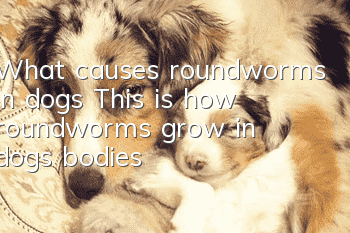What causes roundworms in dogs? This is how roundworms grow in dogs’ bodies

The cause of canine roundworms 1
After puppies under 3 months old swallow infective eggs, the larvae hatch in the intestines. The larvae penetrate into the intestinal wall, travel through the lymphatic system to the mesenteric lymph nodes, and then pass through the lymphatic system to the mesenteric lymph nodes. The blood flow reaches the liver, and then reaches the lungs with the blood flow. The larvae pass through the alveoli, bronchioles, and bronchi, and then are swallowed into the stomach through the larynx. They further develop into adult worms in the small intestine. The whole process takes 4-5 weeks.The second cause of canine roundworms
After older dogs swallow infective eggs, the larvae travel to various tissues and organs of the body with the blood flow and form cysts. The larvae remain active but cannot After further development, after the female dog containing the cyst in the body becomes pregnant, the larvae are activated and migrate through the placenta to the fetal liver to cause intrauterine infection. After the fetus is born, the larvae migrate to the lungs, and then migrate to the gastrointestinal tract to develop into adult worms. Mature canine roundworms appear 23-40 days after the puppies are born.Three causes of canine roundworm
Newborn puppies can also be infected by sucking colostrum. After infection, the larvae develop directly into adult worms in the small intestine.Fourth causes of canine roundworm
Lion roundworm eggs develop into infective eggs under suitable external conditions. After being swallowed by a dog, the larvae escape in the small intestine, burrow into the intestinal wall, develop and then return to the intestinal cavity, where they develop into adult worms in 3-4 weeks.How to prevent ascariasis in dogs
The prevention of ascariasis in dogs focuses on regular inspections and hygiene.1. Check puppies once a month and adult dogs once a quarter to see if they are infected with roundworms.
2. If a sick dog is found, deworm it immediately. You can use levamisole, 10 mg per kilogram of body weight, orally; or use mebendazole, 10 mg per kilogram of body weight, twice a day for two days; or use pyrantel (anti-insecticide), 5-10 mg per kilogram of body weight, orally. ; Or use piperazine citrate (dispelling ascarid) 100 mg per kilogram of body weight, taken orally.
3. Clean and sanitize, and change the breeding environment. We must take the cleanliness of the living environment, troughs, and food seriously, remove feces in a timely manner, and perform fermentation processing to eliminate sources of infection.
Random articles
- Is the super reliable anthelmintic drug easy to use? Sharing the experience of the shit shoveling officer~
- My dog's mouth is smelly and drooling, what can I do?
- How should Shar-Pei be trained? Introduction to Shar-Pei training methods!
- What is the reason why dogs suddenly have weakness in their hind legs in winter?
- How to give potions to dogs
- What is the process of giving birth to a dog?
- What to do if your Norwegian Elkhound has bad mouth
- How to treat otitis externa in dogs
- What are the strength training methods for Tibetan Mastiffs?
- Why is the dog losing hair?



